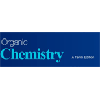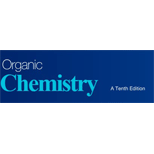Organic Chemistry
CHEM 2400, CHEM 2410
Fall 2025
Required Textbooks for Organic Chemistry I & Organic Chemistry II (CHEM 2400, CHEM 2410):
-
Experimental Organic Chemistry by Perform chemistry experiments with skill and confidence in your organic chemistry lab course with this easy-to-understand lab manual. EXPERIMENTAL ORGANIC CHEMISTRY: A MINISCALE AND MICROSCALE APPROACH, Sixth Edition first covers equipment, record keeping, and safety in the laboratory, then walks you step by step through the laboratory techniques you'll need to perform all experiments. Individual chapters show you how to use the techniques to synthesize compounds and analyze their properties, complete multi-step syntheses of organic compounds, and solve structures of unknown compounds. New experiments in Chapter 17 and 18 demonstrate the potential of chiral agents in fostering enantioselectivity and of performing solvent-free reactions. A bioorganic experiment in Chapter 24 gives you an opportunity to accomplish a mechanistically interesting and synthetically important coupling of two a-amino acids to produce a dipeptide.
Call Number: QD261 .G54 2016ISBN: 9781305080461Publication Date: 2015-01-01 -
Organic Chemistry by In the 5th Edition of Organic Chemistry, David Klein continues to set the standard for how students learn by building on his innovative SkillBuilder approach - enabling learners to effectively grasp the complex language of organic chemistry through structured, guided practice. Joining David Klein for this edition as an author is longtime collaborator Laurie Starkey (Cal Poly Pomona), whose classroom creativity, digital expertise, and positive teaching style bring a fresh perspective to Organic Chemistry. Her contributions enhance the proven SkillBuilder method, infusing it with new pedagogically relevant photo examples that make the material even more accessible and engaging for students. The new edition is thoughtfully updated with extensive content revisions, refined SkillBuilders, and fresh examples--all shaped by valuable feedback from instructors. It also introduces a wider range of diverse examples, vivid illustrations, and practical applications tailored to both Organic Chemistry I and II. Together, Klein and Starkey have crafted a comprehensive and dynamic resource that blends proven techniques with fresh insights, ensuring the best learning experience for students.
Call Number: AVAILABLE FOR PURCHASE ONLINEISBN: 9781394189373Publication Date: 2025-02-05
Required Textbook for Organic Chemistry I (CHEM 2400):
-
Organic Chemistry by In Organic Chemistry, 4th Edition, Dr. David Klein builds on the phenomenal success of the first three editions, with his skills-based approach to learning organic chemistry. The Klein program covers all the concepts typically covered in an organic chemistry course while placing a special emphasis on the skills development needed to support these concepts. Students in organic chemistry need to be able to bridge the gap between theory (concepts) and practice (problem-solving skills). Klein's SkillBuilder examples and activities offer extensive opportunities for students to develop proficiency in the key skills necessary to succeed in organic chemistry.
Call Number: QD253.2 .K55 2021ISBN: 9781119659594Publication Date: 2020-12-22
Recommended Textbooks for Organic Chemistry I & Organic Chemistry II (CHEM 2400, CHEM 2410):
-
Organic Chemistry As a Second Language by Organic chemistry is a challenging subject, with many students expecting it to require many hours of memorization. Author David Klein's Second Language books prove this is not true--organic chemistry is one continuous story that actually makes sense if you pay close attention. Klein's books use a conversational tone making them more accessible and easier to read for students. Organic Chemistry as a Second Language: Second Semester Topics, 6e builds on the principles explored in the first half of the course, delving deeper into molecular mechanisms, reactions, and analytical techniques. Using Klein's one-of-a-kind SkillBuilder approach, the book includes hands-on exercises and thoroughly explained solutions designed to further reinforce student comprehension of chemical concepts and organic principles. An indispensable supplement to the primary text, this resource covers aromatic compounds, infrared (IR) and nuclear magnetic resonance (NMR) spectroscopy, nucleophilic and electrophilic aromatic substitution, ketones and aldehydes, carboxylic acid derivatives, and much more. Organic Chemistry as a Second Language: Second Semester Topics, 6e teaches students how to ask the right questions to solve problems, study more efficiently, and learn to speak the language of organic chemistry. Like its first-semester companion title, it is an essential 'guide on the side' for any organic chemistry student no matter what textbook or instructor-provided lecture material is used. The inclusion of new end of chapter problems, providing both practice and challenge, will prepare students and build confidence come exam time, as well as outside the classroom.
Call Number: AVAILABLE FOR PURCHASE ONLINEISBN: 9781119837053Publication Date: 2024-03-12 -
Preparing for Your ACS Examination in Organic Chemistry by Organic Chemistry Study Guide
Call Number: AVAILABLE FOR PURCHASE ONLINEISBN: 9781732776418Publication Date: 2019-12-01
Recommended Textbook for Organic Chemistry I (CHEM 2400):
- Apply the rules of organic nomenclature, including the ability to name organic compounds and draw correct structures from names.
- Describe chemical structures and relate them to physical properties of organic compounds.
- Correlate molecular structure and spectroscopic behavior.
- Describe and apply fundamental reactivity concepts such as acidity, basicity, electrophilicity, nucleophilicity, electron delocalization and rules of resonance.
- Describe the mechanisms and outcomes of addition, substitution and elimination reactions of simple organic compounds.
- Describe and perform basic organic laboratory techniques.
- Recognize major functional groups and name organic compounds containing these functional groups.
- Understand and apply the basic rules of reactivity, nucleophilicity and electrophilicity to organic compounds.
- Describe simple resonance schemes and their importance to stability and reactivity of organic molecules.
- Demonstrate mastery of simple organic reaction mechanisms.
- Recognize functional groups in biochemical compounds and their chemistry.
- Apply basic organic laboratory techniques to synthesize, purify and broadly characterize simple organic compounds.
Library Resource Quick Search
Search our library resources by selecting an option below:
 Search Full Text Finder to find the full text of a publication.
Search Full Text Finder to find the full text of a publication.
If you see an embargo next to a e-journal title: An embargo period is a period of time which an official academic publication is not yet available online, either due to publishing restrictions or subscription contracts. Ex: "Embargo: 1 Year" = access begins one year ago from today's date.
If you have the DOI of an article, you can search for the article using DOI Tools.

|
Databases: search for articles, datasets, and videos on your topic |
|
|
View Databases by Subject OR All Databases |
|
 Search NSUWorks - NSU's Institutional Repository:
Search NSUWorks - NSU's Institutional Repository:
Browse or search scholarship in Digital Commons @ NSUWorks!

Find research tips, useful resources, and more by searching our LibGuides or browsing the topics below:
Oceanographic Campus Library Guides | Writing & Citation Style | Course Guides | Browse by Subject | How-To Guides | LibraryLearn : Short Video Tutorials | Razor's Research Bytes |

NSU Oceanographic Campus Library, 8000 North Ocean Drive, Dania Beach, Florida 33004
(954) 262-3699 | oclibrary@nova.edu | Hours | NSU Libraries

